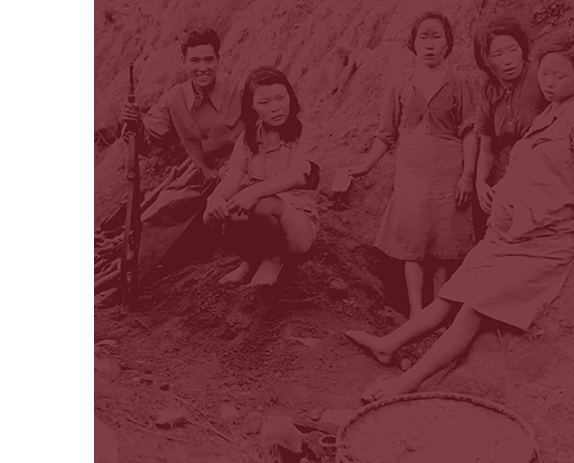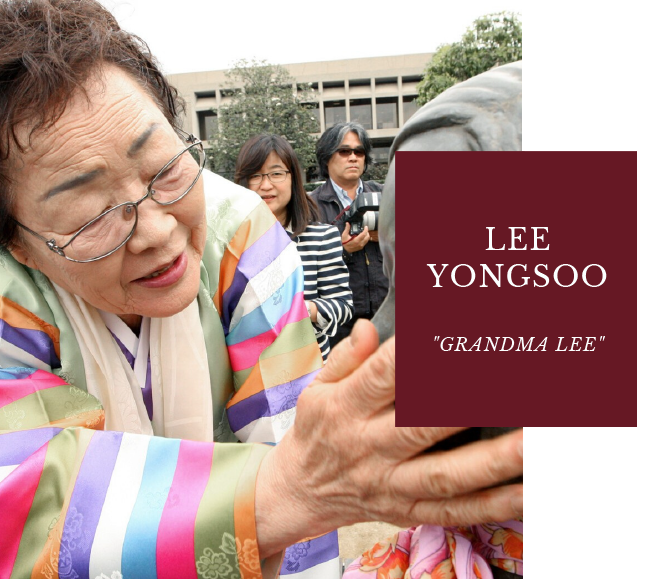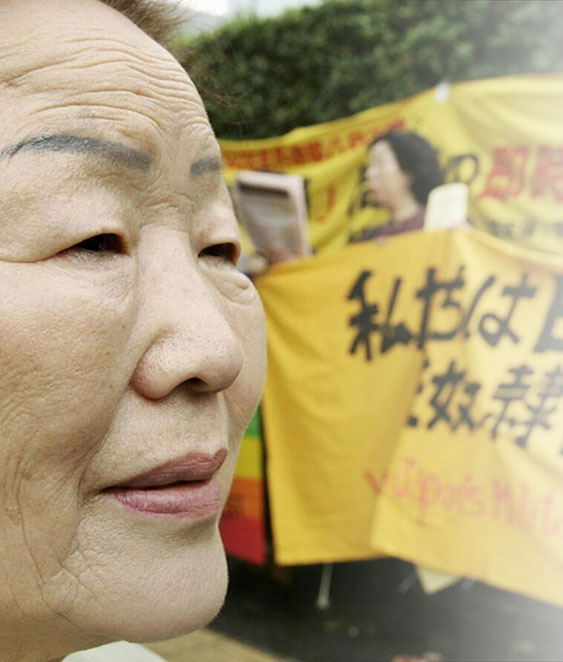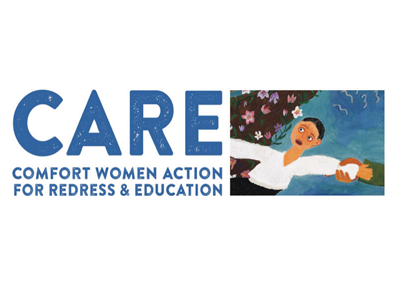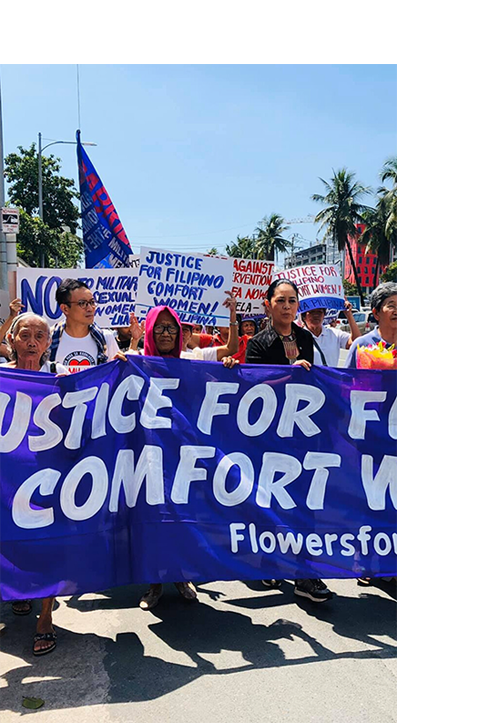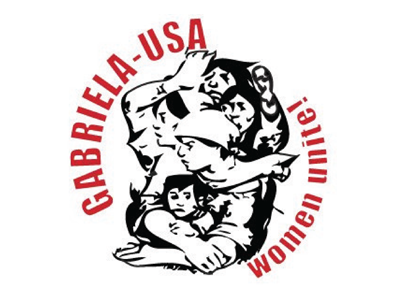위안부행동 재정공개
May 21, 20207 Demands by the victims to Japanese Government
July 16, 2020
Webinar
Agenda
"Comfort Women": Who Are They?
by Professor Alexis Dudden
Testifying for Justice
by Grandma Lee Yongsoo
Discussion and Q&A
Moderated
Conclusion: Next Steps
This webinar series is collectively presented by:
STAND at Yale, Comfort Women Action for Redress and Education, Comfort Women Justice Coalition,
GABRIELA USA, Lila Pilipina
Yongsoo Lee was born in 1928 near Daegu, Korea,
and grew up under Japanese colonial rule. Her family
was poor so she only had a few years of schooling
before she had to quit to stay home to take care of
her younger brothers while her parents worked.
Ms. Lee was 15 years old when she was forcibly taken
and made into a sex slave for the Japanese Imperial
Armed Forces during WWII. Under the surveillance of
soldiers and harsh treatment, she and other girls were
transported via train and military ship, she was taken
to a comfort station at a Kamikaze unit in Taiwan
where she was held until the war ended. She went
through brutal beating, torture and gang rape since
she was captured.
After the war, she was abandoned along with other
girls by the retreating Japanese, but she was able to
return to Korea with the help of the Allied Forces. She
lived in silence until 1992 when she registered with the
South Korean government as a victim of Japanese
Military Sexual Slavery.
At first, she thought what happened to her was an
isolated incident and didn’t think there were numerous
others who went through the same fate. She later
realized so many other women were subject to the same
atrocity she went through.
She also realized that unless she spoke out and tell the
world what happened to her, the same crime was
doomed to repeat itself, victimizing more women around
the world. She started to speak out, demanding the
Japanese government for an official acknowledgment
and apology, and legal compensation for this crime.
Now she is a very active human rights and women’s
rights activist, traveling the world to raise awareness
about this largest case of institutionalized sexual slavery
and human trafficking in the 20th Century.
She was one of the three survivors who testified before
the US Congress, Committee on Foreign Affairs,
subcommittee on Asia, the Pacific, and the Global
Environment in February 2007.
She made numerous trips to the US, to support the
efforts by American citizens to raise awareness and
educate the public through activities such as the
passage of H.Res.121, memorial building in public sites,
speaking tours and protests against Japanese
government’s denials.
Ms. Lee came to San Francisco in September of 2015
to support the installation of a ‘Comfort Women’
memorial in San Francisco’s public park. With her
testimony at the City Hall hearings, the resolution
passed unanimously, despite aggressive oppositions
from the Japanese history deniers. She is a recipients
of numerous recognitions for her work as a human
rights activist, including the California State Senate
and Los Angeles City Council, as well as Korean
National Assembly. She lives in Daegu, South Korea.
Alexis Dudden is professor of history at the
University of Connecticut, where she teaches modern
Japanese, Korean, and international history.
Dudden received her BA from Columbia University in
1991 and her PhD in history from the University of
Chicago in 1998. She has lived and studied for
extended periods of time in Japan and South Korea,
with awards from Fulbright, ACLS, NEH, and SSRC as
well as fellowships at Princeton and Harvard. She is
the 2015 recipient of the Manhae Peace Prize, and
her books include Troubled Apologies Among Japan,
Korea, and the United States (Columbia) and Japan’s
Colonization of Korea (Hawaii).
Currently, Dudden’s research centers on Japan’s
territorial contests with regional neighbors,
completing a book project tentatively called, The
Opening and Closing of Japan, 1850-2020 (with
Oxford). She publishes regularly in print and online
media, and recent examples include "America's Dirty
Secret in East Asia" (NYT) and "Japan's Rising Sun
Flag Has a History of Horror" (Guardian).
STAND at Yale
STAND is a student task force at Yale
University united by a passion for women’s
rights and justice. In April 2016, two
"Comfort Women" survivors gave a
testimony at Yale to more than 600
students and faculty. Inspired by their fight
for historical justice, students formed the
task force shortly afterward with the aim
of educating others on the history of
“Comfort Women” and wartime sexual
violence.
"Comfort Women"Justice Coalition
CWJC is a grassroots, multi-ethnic and
multi-national group of individuals and
organizations that are part of the global
“Comfort Women” Justice Movement. They
are guided by the leadership of the
grandmothers (the surviving “Comfort
Women”). In 2017, CWJC unveiled the
memorial Comfort Women: Column of
Strength in San Francisco to remember
the hundreds of thousands of women and
girls sexually enslaved by the Japanese
Imperial Army and to educate the public
about their history.
Comfort Women Action for Redress and Education
Comfort Women Action for Redress and
Education (CARE, formerly known as
Korean American Forum of California),
began their work to bring justice for the
Grandmas in 2007 with the campaign to
pass H.Res. 121 at the US Congress. CARE
was responsible for building the Peace
Monument statue in Glendale City Park in
2013 and fought the lawsuit that tried to
remove the statue.
GABRIELA USA
GABRIELA National Alliance of Women is a
grassroots-based alliance of more than
200 organizations, institutions, desks and
programs of women all over the
Philippines seeking to wage a struggle for
the liberation of all oppressed Filipino
women and the rest of our people. While
they vigorously campaign on womenspecific
issues such as women’s rights,
gender discrimination, violence against
women and women’s health and
reproductive rights, GABRIELA is also at
the forefront of national and international
economic and political issues that affects
women.
Lila-Pilipinas
Lila Pilipina is an organization of World
War II 'comfort women' - victims of
wartime military sexual slavery by
Japanese Imperial Army


